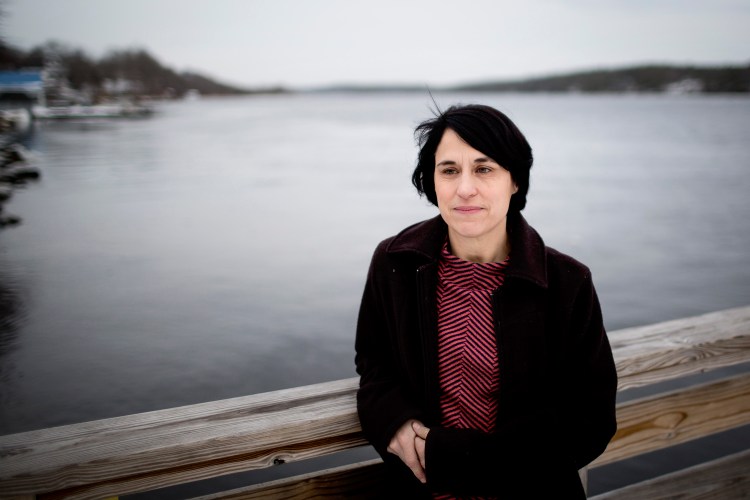This month, Kate Dempsey was named state director of The Nature Conservancy in Maine. She’s been with the international nonprofit’s Maine chapter for 12 years, most of it serving as the conservation group’s senior policy advisor for federal affairs. We called her up to talk about her new responsibilities and learned how Quaker school steered her life course, what it means to follow the legacy of Rachel Carson and why people talk about “doing a Penobscot” in China.
MAINE BUG: Dempsey grew up in Philadelphia and came to Maine to attend Bowdoin College. At that point in her life she had, she said, a deep commitment to the issue of affordable housing. And another thing: “I was really deeply committed to lacrosse as well,” she said with a laugh. After putting down the sticks, she went to Kansas City, Missouri, as a VISTA volunteer (Volunteers in Service to America) and then moved to Washington, D.C., for her first policy job, working for the Friends Committee on National Legislation, the lobbying arm of the Quakers.
FRIENDS FOREVER: Dempsey went to a Quaker school, which included attending Quaker meetings, an experience she connects directly to what she does now. “Really what was instilled in me was the sense that it was my responsibility being here on the planet to give as much as I can to the community. And that I have an opportunity, in fact, an obligation, to connect with people, to try to make a difference. That is something I have carried with me always.”
AT THE HOUSE: She worked as a policy advisor for Tom Allen when he represented Maine’s 1st Congressional District and also for another congressman, Massachusetts’ Marty Meehan. “My job had been knowing the federal budget, which is pretty arcane, inside and out. When you work for a member of Congress, there needs to be someone who knows how to help the district find sources of funding.” She was originally hired by The Nature Conservancy to do the same type of policy work, focusing on land and water issues.
PLUNGING IN: Dempsey arrived at The Nature Conservancy right around the time the framework for the Penobscot River Restoration Project was being laid among a network of partners including the Penobscot Indian Nation, Atlantic Salmon Federation, the U.S. Department of Interior, the Natural Resources Council of Maine, the state of Maine and the owner of several dams on the river. (The Nature Conservancy joined the partnership in 2006). Dempsey helped raise money for the project – which included the removal of Great Works Dam in 2012 and the demolition of the Veazie Dam in 2013 – as well as working with both the Bush and Obama administrations on it. That broad partnership, working collaboratively, had a powerful impact on the nonprofit. “For the Conservancy, it has really shaped our strategy about how we do our work.”
FINEST HOUR: The Penobscot project is the work achievement that makes Dempsey the proudest. “There are very few moments where you truly know you are having an impact, and that project has had an impact on me both personally and professionally, and on the world.” To wit, the Nature Conservancy’s CEO was in Bejiing last year and met with people working to protect the already seriously jeopardized Yangtze River from further environmental threats, including extensive planned dam construction (12 new ones) on the heels of the Three Gorges Dam, which displaced over a million people and untold wildlife. “They called it ‘Doing the Penobscot’ and when you hear that, you are like, ‘that is pretty amazing.”
LESSONS LEARNED: The effort took a good 15 years for the project’s organizers, and to Dempsey it represents the power of forming strong partnerships and digging in for the long haul. “It shows that continuity of purpose is really important in this work. Not letting people down. Not going back on your word. So that communities who are affected one way or another feel like they have control and ownership of the project.” That’s the philosophy she intends to bring to this new position.
SPEAKING OF NATURE: It’s hard to pin down a nature lover on just one favorite spot in Maine, so we let Dempsey get away with two: Popham Beach and Lily Bay State Park, where she and her family go most years to camp. “Moosehead is just iconic,” she said. Maybe Popham gets the edge, though: “The place closest to my heart is Popham Beach.” For summer fun, obviously. “But it’s also where I go even on a day like this in the dead of winter,” she said. “To see that the world is just so huge, so expansive. It is a reminder to me that things are much bigger than I am.”
PRACTICAL MAGIC: Rachel Carson, who founded The Nature Conservancy in 1956, once noted with pride that the group was the only conservation group she knew that was engaged in highly practical work. Dempsey agrees, especially on the matter of jobs. “It is really important to me personally that the people of Maine have jobs connected to the natural world,” she said. That could include careers as disparate as fishing, where thinking about sustainability goes hand in hand with the job, to working for the Department of Transportation, where decisions about say, wildlife corridors, can make all the difference.”You don’t have to work for a conservation group to make a difference. There are so many ways that people can work for the natural world that aren’t as obvious as my job.”
LAST WORD: “I won’t even say that I am following in Rachel Carson’s footsteps; I am just honored that the organization continues to follow in her footsteps.” She took a deep breath. “Guess I have got to get working!”
Send questions/comments to the editors.



